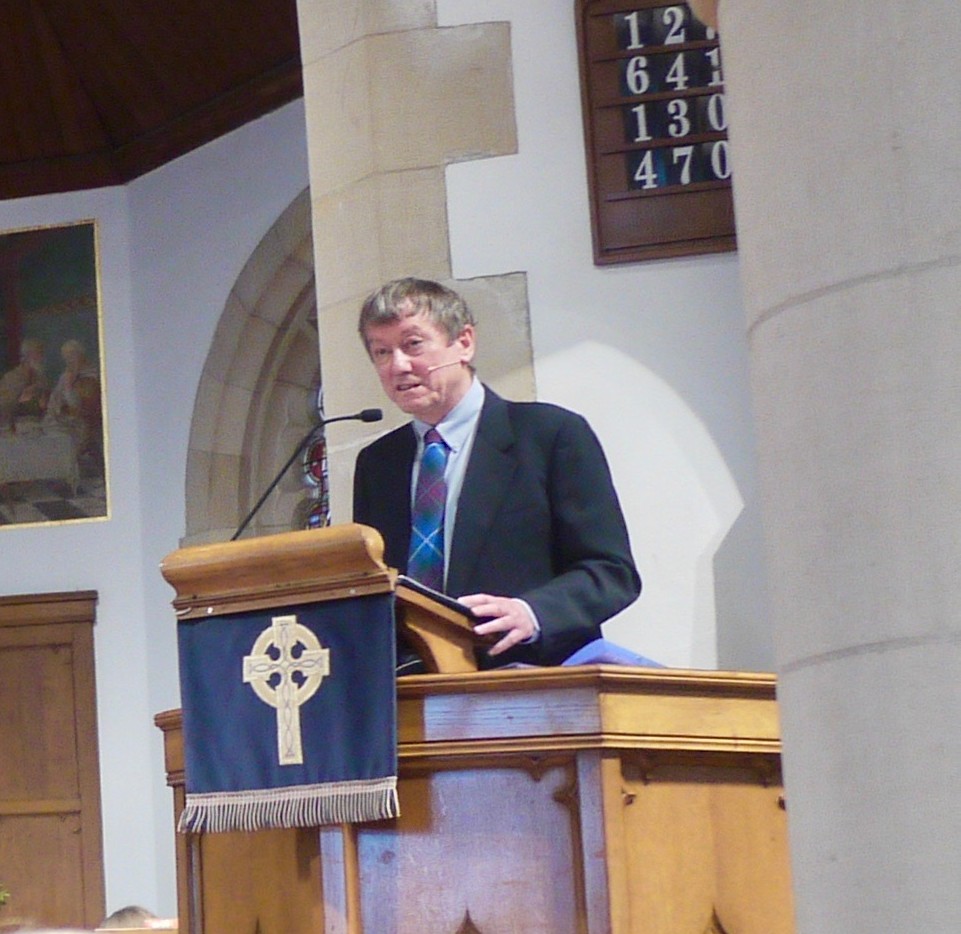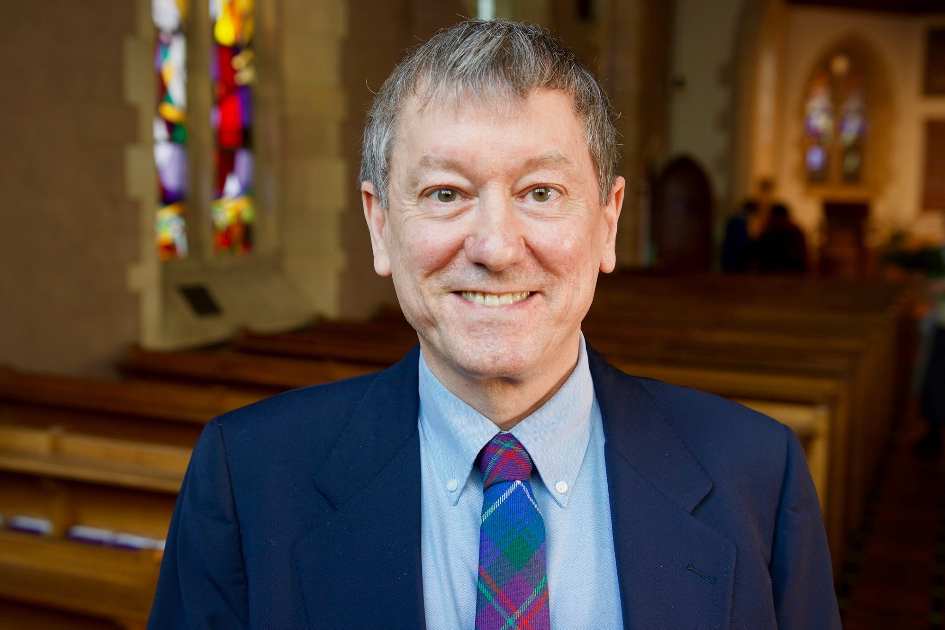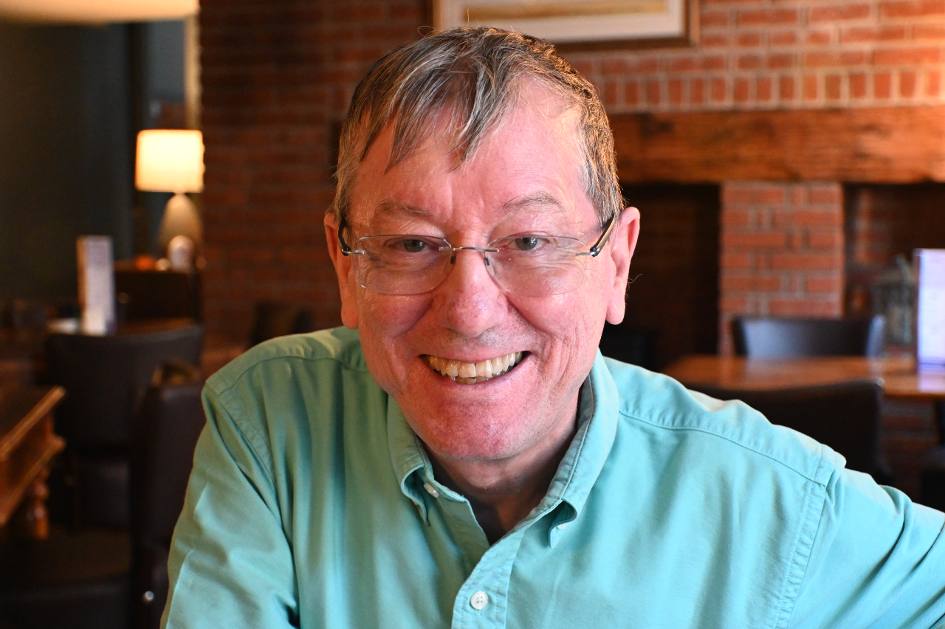October 2024: David Lloyd
Each month, the Church of Scotland's Talking Ministry series shares a personal story from those serving in Christian ministry, along with resources filled with questions, prayers and reflections to help encourage reflection on how God might be calling you at this time.
For October, David Lloyd speaks about his role as a trainee Ordained Local Minister (OLM) based at St Andrew's Church in Brussels, part of the Church of Scotland's International Presbytery.
My ministry: David Lloyd, probationer ordained local minister, St Andrew's Church, Brussels
David Lloyd was born and brought up in South Shields in Tyneside, but has lived and worked in Belgium for more than 30 years. Away from his career in telecommunications operations, his interests include exploring the more remote northern countryside both in the UK and further north, but he has also gone to the opposite extreme and visited Antarctica, enabling him to experience a bracing swim in both the Arctic and Antarctic oceans.
He is currently in the final stage of his training and hopes to be ordained as an OLM in early 2025.
Has church always been part of your life?

My family were low church Anglican and lived opposite the church so we went most Sundays. I stopped going when I went to university, but after a while I realised something was missing and started going from time to time with other people.
When I started working in Brussels, I began attending the Church of Scotland, which was an English-speaking church with a style of worship that was similar to the one I was familiar one. I liked the sermon, but after the service one of the elders asked if I was new. That made a difference, that they had made a point of talking to me. It struck me that this seemed to be a quite caring environment, so I went back. At one point, when I hadn't been there for a while, someone from the church contacted me and asked if I was OK because they hadn't seen me. That made me glad that I had gone to that church.
It struck me that this seemed to be a quite caring environment, so I went back.
I then started going to an Alpha Course, which got me closer to people in the church and I became part of the communications team. Later on, I was asked to become an elder.
What inspired you to consider studying for the ministry?
I am, until the end of 2024, convenor of the International Presbytery education, training and safeguarding committee.
As part of my job, I had a conversation with Angie McNab, the Church of Scotland recruitment co-ordinator, to get more details about Readership and Ordained Local Ministry roles. At the end of the call, I commented that I wished that I had known about the OLM role before, but thought it was too late to apply as it was something I felt drawn to. Angie said that it wasn't and suggested that I apply, which I did, and was accepted onto the programme.

Why did you feel the role of OLM was a good fit for yourself?
I think the concept of an OLM is a good one, allowing you to be a minister who can lead worship and perform the sacraments while having a full-time job as well.
I had led worship a couple of times during our vacancy year and participated in and led Bible studies, and I find explaining the gospel to be both challenging and uplifting. I enjoy digging into the historical context to get at the message the writer was trying to convey and relate it to modern life.
I thought that this experience would be a good grounding for the OLM programme.
Why OLM and not Readership?
I chose OLM because of the significance of the sacraments. Communion reinforces the church family and the community of the church and that connection with Jesus, while with baptism, I was baptised as a child and it had a big impact on me. If that feeling of belonging to a church is given to a child, that is a really good thing.
If it is a baptism involving someone who is outside the church family, you also have a missional opportunity to encourage them to become part of the church. Whether you are doing a baptism or a blessing, that dialogue takes place and you are bringing someone closer to the church.
My position in the church has shifted and people treat me in a slightly different way. They come to me now with things that you would go to a minister with, so there is a pastoral element.
One recent example was an American woman who had planned a big European trip and everything had gone wrong from the minute she got on the ‘plane in America. She came to our church and she turned to me in the pew and said she was leaving for Amsterdam but was terrified about what would happen next and asked me to pray with her. So, we just prayed together. I liked that because it was one of those moments where I wondered what to do, but then I felt guidance about what to say.
As an OLM with the Church of Scotland's International Ministry you have a unique role. What does that involve?

In the International Presbytery we face similar challenges to those in Scotland. The biggest difference is that we are quite distant from other churches in the presbytery so cover a big area. If I was in Scotland, I could probably walk or take a short drive on a pastoral visit, but with some people I have to visit, it's an hour's drive so a pastoral visit can take half a day.
We also minister to people of about 35 different nationalities and many religious backgrounds who may have widely different theological perspectives, from evangelical to reformer. Our church is a "broad church" in every sense.
Another challenge is that Brussels is a place of diplomatic postings, so you get people coming for two or three years and then they rotate out, so while we have a permanent congregation, we do lose some quite active people who will go away for work or go back to the UK or wherever they are from when they retire.
Presbytery planning was a particular challenge as it has reduced the number of ministers in the Presbytery from 12 to 5.5 so the role of Reader and OLM has become important in supporting full-time ministers in linked charges.
Our church in Brussels will be vacant from June 2025 so my role, with our Reader Sia Van den Bremt, will be to ensure the congregation has continuity through what may be a long vacancy period.
What have been the big surprises, events or people which have shaped your ministry?
I realised soon after starting that the training programme is a start and not an end. Ministry is a continual learning experience, and I expect to continue learning after I finish the programme.
I had led a couple of services before I applied and thought I would just be smoothing off a few rough edges. The reality was that the more I learned the less I found I knew.
Just because you have done a sermon once doesn't mean you can automatically think of yourself as a minister. It's been enriching in that sense, but also humbling in the sense that I keep finding out things that I never knew and things that I have to learn.
Sermons are quite a challenging thing to do. Once you start digging into it, you realise that a sermon is not just a talk or a Bible study tool. It has what Rev Dr Ken Jeffrey at Aberdeen University described as "the Jesus moment", explaining the Gospel and finding a connection with Jesus that people take away afterwards. That's why it is so challenging and why it is something I am constantly learning and talking to various supervisors about.
I have met an amazing group of people during my time in the programme. Candidates and trainers have all been supportive and inspiring and the candidates and probationer conferences have been a good way to see how others do things and to build up a support network.
The workload is quite high and that was a surprise, and I find difficulty sometimes in trying to balance church and work. You have to set limits and be able to find a space in between and have some downtime.
The programme is the most challenging and rewarding thing I have done.
What keeps you encouraged and excited about ministry?
For years the church has been talking of decline, but I feel it is in a period of change and growth where worship may not always be on Sunday and meetings may take place in other locations than a traditional church. The people I have met in training are an incredible group and are sure to help the church through its period of change and growth.
For myself, the churches of the International Presbytery are a "home from home" for people wanting reformed worship and I am keen to support our church and congregation as we go through the vacancy period and, hopefully after not too long, introduce a new minister.
Where is your ministry taking you next?
I am in the final phase of my probation and hope to be ordained in the first part of 2025.
Our church will then become vacant so I will work to support our congregation and locum ministers.
What would you say to encourage anyone considering training to be an OLM?
I would encourage them to go for it. It is not easy, but the challenge is worthwhile and stretches you beyond your comfort zones. If anyone thinks it is not for them, I would encourage them to explore it. Talk to the people who have done it and you get a different picture.
I do think we could do more to publicise the role of OLM or Reader because there are people out there who have got the talent and would find Readership or being an OLM a rewarding part of their lives.

October Discernment Resources: Taking the Risk
What am I being asked to do?
The stories of faith are full of risk takers: Abraham, Rahab, Priscilla, Paul and many more. When we think about our lives and the way we live them in the context of our faith, such stories give us glimpses of how others have lived, and the choices they have made. Our faith stories are colourful, and the story of Jesus reveals actions taken, decisions made and their consequences.
When we are at a crossroads discerning choices, it is exciting, scary and challenging. The myriad characters in our Bible stories are overwhelming, awfully heroic. Abraham hears a voice asking him to give up everything familiar and he does. Paul sends Priscilla to the capital of C1st oppression to explain his Letter to the fledgling Roman Christians, and she goes! Jesus makes for Jerusalem that final time, knowing it is the city that kills the prophets. Our faith may call us to step away from familiar things and people, and in order to be capable of doing that, to be able to survive unknown rigours, we are surely called to reasonably prepare and question.
25 Shortly before dawn Jesus went out to them, walking on the lake. 26 When the disciples saw him walking on the lake, they were terrified. "It's a ghost," they said, and cried out in fear. 27 But Jesus immediately said to them, "Take courage! It is I. Don't be afraid." 28 "Lord, if it's you," Peter replied, "tell me to come to you on the water." 29 "Come," he said. Then Peter got down out of the boat, walked on the water and came toward Jesus. 30 But when he saw the wind, he was afraid, and beginning to sink, cried out, "Lord, save me!" 31 Immediately Jesus reached out his hand and caught him. "You of little faith," he said, "why did you doubt?" 32 And when they climbed into the boat, the wind died down. 33 The others who were in the boat worshiped him, saying, "Truly you are the Son of God."
St Matthew 14 vv 22 - 33
We are all called by God to do something, and we believe God knows us very, very well. The stories of faith are often about people finding incredible strength and courage to do amazing, miraculous things for God. Such stories, such examples are energising, inspiring, even catalysing.
But Jesus looked at them and said, "For mortals it is impossible, but for God all things are possible."
St Matthew 19 v6
Running within and through rich Biblical seams are details which are also steadying, wise, orientating and grounding as our hearts beat faster at our crossroads. An outstanding detail in Peter's story above is that he wasn't alone. He was with the disciples in the boat, and with Jesus when he got out of it. He did an impossible thing using the well of friendship, inspired by Jesus.
American writer Margaret Wheatley is a management consultant. She studies change theory, leadership styles, chaos theory and how people and organisations learn, in particular our capacity to self-organise. Pastor Tod Bolsinger includes this quote by her in his book:
It is possible to prepare for the future without knowing what it will be. The primary way to prepare for the unknown is to attend to the quality of our relationships, to how well we know and trust one another.
Pastor Tod Bolsinger, 'Canoeing The Mountains'
To Contemplate/discuss/pray for …
I'm approaching/ I've reached a crossroads in my life. How am I feeling?
When I think about not making a change, to remaining in the life I know, how do I feel?
When I imagine taking a step towards the unknown, is there a Biblical story which keeps coming back to me?
Who can I talk to, to explore how I'm feeling, to discern next steps?
What are the risks at this point in my life? Who are the sources of help and sustaining support?
What should I let go of, and what should I take hold of to discern and walk my life of faith?
Prayer
Risky, Creator God, when light pierced dark in the moment of Creation, Nothing became Something. Your miraculous move urges us all to change and grow. Chance and surprise are inevitable. You know us in our marrow and we seek the same understanding. Draw acuity and kindness from deep in ourselves to assess our unknown future and prepare for measureless risk, even if we remain in our known way. Always in your name, Jesus Christ. Amen.
More information
If you would like to consider how God might be calling you to serve at this time, you may want to discuss further with your minister or be in touch with your Presbytery to explore local opportunities.
If you are interested in exploring a call to the recognised ministries of the Church, you can find more information on our vocations page and can contact ministry@churchofscotland.org.uk for a Discernment Conversation with one of the Recruitment Team.